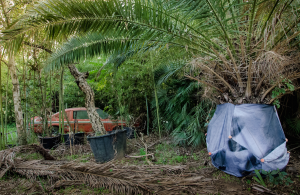Da “The Fire of ‘Bu:”

di Eva Macali
Yˈəm
The tree opens the door I am
through the ma comes the a-ha
no guardian no gaze Yˈəm
ma passing a-ha the tree the door
ma-ha comes and goes the door
the ˈbuː the ˈvæn the run a-ha
the door is open the gaze regards
ma-a-ha meets I-am in the green
the tree you gaze is a green door ha
me passing the door you green the run
yum yum no longer stares the door
you pass the green maha door ha
the snake wakes and crawls the door
green ma meets the snake the ˈvæn the ˈbuː
worthy tree is green and run run ha
I am-pass the door and enter the Yˈəm
.
*
Saty crown
The crown they call my saty
‘sæt ‘sæt at the palace of Yˈəm
past times queens and kings
yes yes call me saty I am
Kingdom of saty the beach
the sea, now swimming along
you’re given the crown yum yum
in the water and the air tip tap ha
Belonging to saty water of Yˈəm
we’re crowning along the shore
Saty’əm togethernes of savvy ˈbuː ˈhuː
in the kingdom of the loving crown
tip tap shoes are coming too ha
the shore run ˈvæn meets the foam
togetherness bathing the kingdom
queens and kings of Saty’əm-ha
[Annotazioni di lettura: un racconto fiabesco, si legge la frase intera]
*
ˈVæn vuh
vague vague / ˈvæn-guard-ˈvæn
in the van / guardian guard
guarding / guar-guar dee
de-guard / vanish ˈvæn-ˈvæn
vanishing ˈvæn / guardian vuh
guarding the guard / off the van
ˈvæn vuh / is the guarding man
man · man · man · man · ˈvæn vuh
viable guard / views man-man
man / guarding / is staring the van
the guard / ˈvæn-vans the man
ˈvæn vuh the guard / is staring the vuh
vuh / is the name of væn-væn
vuh / is my name my staring man-man
loving man loves / ˈvæn-ˈvæn vuh
meaning / man / ˈvæn vuh guard
a van / van guards / the man
of staring the stars / ˈvæn vuh
guardian vuh / off the stars
a vuh / loves all / so does / man-man
the guar / guards the guard van
a vuh / stares off the stars
man · man · a ˈvæn · guards
vuh-stars / off off / regards
[Annotazioni di lettura: un racconto fiabesco, voce convinta]
*
Due testi dall’operetta in sette atti The Fire of ‘Bu:, scritta in una lingua inventata per essere sonorizzata a due voci da Eva Macali e dalla cantante Alice Ricciardi.
Immagine: Eva Macali, Grande dodecaedro, parte del ciclo Albero Giallo, 2017, ph. Francesca Lucidi.

